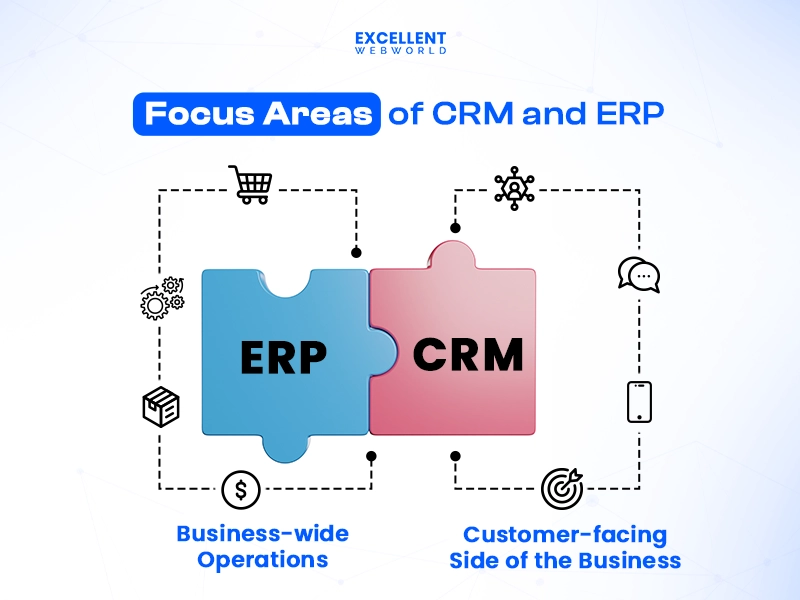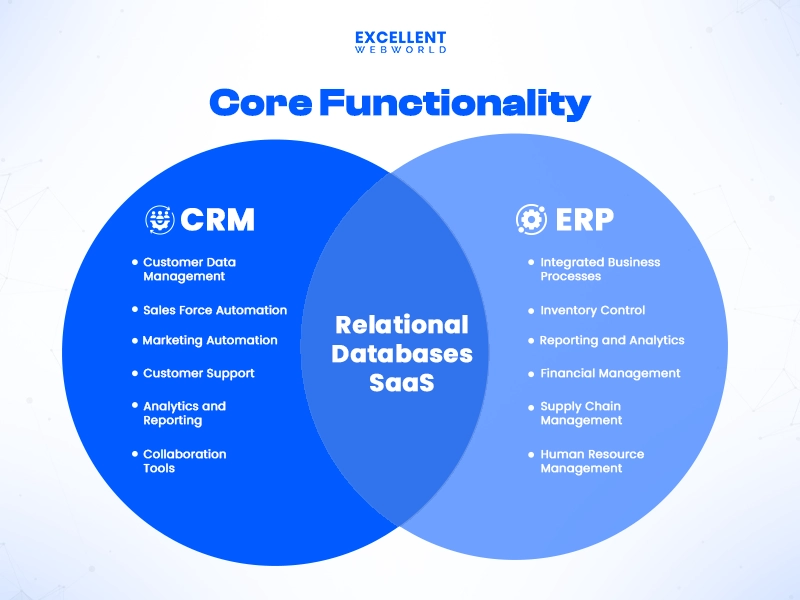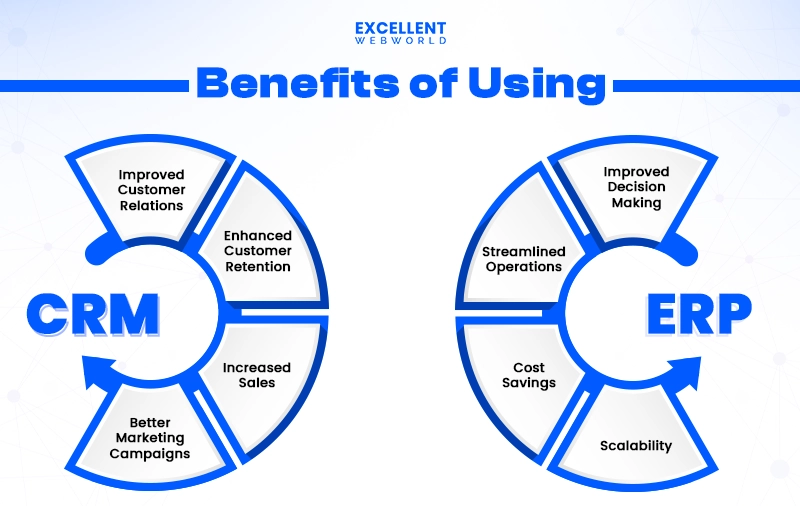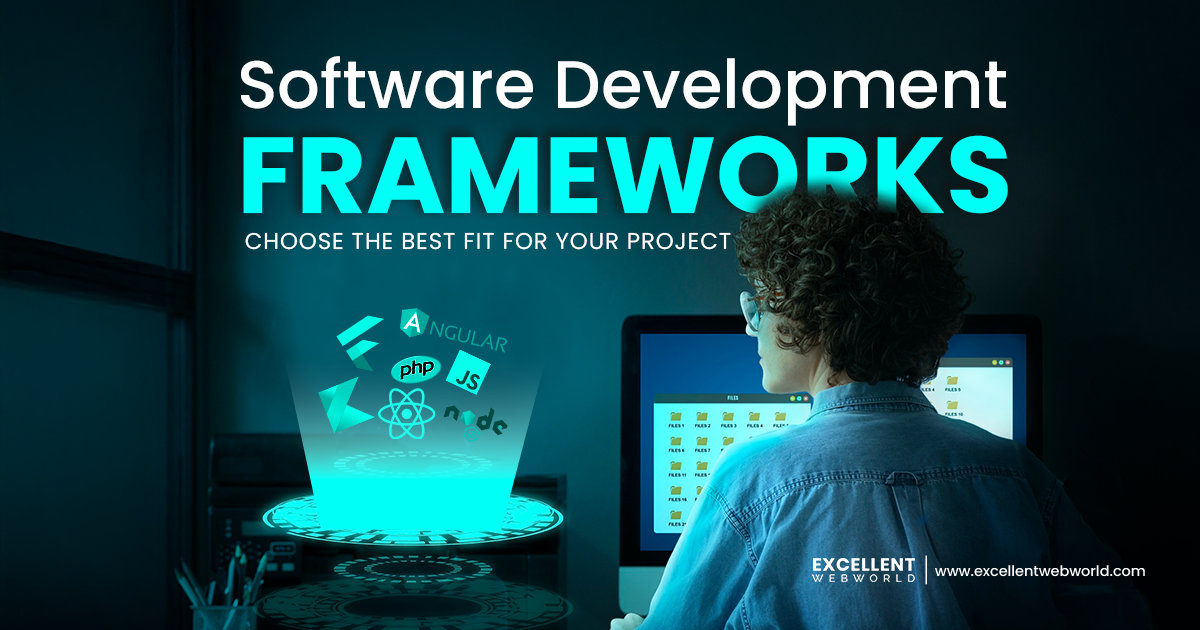Streamlining business operations and building strong customer relationships are crucial challenges that every business has to face! Considering a long-term business perspective, managing operations with spreadsheets and notes is not an option anymore. The debate between ERP vs CRM needs attention as both powerful tools serve different but complementary functions for business management.
Enterprise Resource Planning (ERP) systems are meant for back-office operations such as finance, inventory, supply chain, and HR. On the other hand, Customer Relationship Management (CRM) enhances front-office business functions like customer interactions, sales, advertising, and marketing efforts.
Both CRM and ERP systems integration boost the productivity of businesses with simplified data management and task automation. However, there are key differences between ERP and CRM that entrepreneurs need to understand before investing in any solution.
In this blog, we compare CRM vs ERP, learn about similarities and differences, and discuss factors that help choose the best option for businesses.
ERP vs CRM: Understanding Differences
CRMs are meant to handle customer-side operations, while ERP software manages business processes. We have mentioned aspects like definitions, features, benefits, and best practices to better understand the difference between ERP and CRM.
| Aspect | CRM | ERP |
|---|---|---|
| Primary Focus | Customer Relationships | Business Operations Management |
| Target Users |
|
|
| Main Functionality |
|
|
| Data Focus |
|
|
| Implementation Time | Shorter, Focused on Customer-facing Departments | Longer, Requiring Integration Across Departments |
| Cost | Generally lower, but varies depending on the custom CRM development service provider. | Higher Due to Complexity and Scale |
Let’s start discussing each factor one by one for both software solutions!
Definition: Front Office vs. Back Office (CRM vs ERP)
What is CRM?
As the name suggests, customer relationship management, or CRM, is software built to streamline a company’s interactions with customers, prospects, and leads. The CRM system organizes, automates, and synchronizes front-office tasks such as sales, marketing, customer service, and support. The core intention of integrating CRM is to enhance customer relationships and improve business retention.
What is ERP?
Enterprise resource planning, or ERP, is a shared database for all the parts of an organization. At the core, ERPs are meant for finance operations, including accounts payable, accounts receivable, general ledger (GL), payroll, and financial tracking and reporting.
ERP systems fulfill the company’s materialistic requirements, such as inventory management, supply chain management, demand forecasting, procurement, and production planning. In short, they expedite seamless business processes and automate several manual tasks to boost productivity.
Key Features of CRM vs ERP
CRM and ERP software have several use cases across various industry businesses. To understand the functionality difference between ERP and CRM, we compare each solution’s most common feature list.
Top Features of CRM
Top Features of ERP
Read More: Software Development Process
ERP vs CRM: Top Benefits
Let’s explore the advantages of using CRM and ERP systems for businesses.
Benefits of CRM Software
Benefits of ERP Software
When to Choose CRM vs. ERP?
Businesses can choose one solution or both, depending on their current conditions. Let’s explore scenarios for choosing either one or both CRM and ERP systems.
Aiming for Better Customer Engagement – CRM is Ideal
CRM is best for businesses whose current focus is on gaining customer loyalty.
If the current goal of businesses is to focus on improving customer relationships and enhancing customer engagement, then the CRM system is the perfect choice. Tracking customer interactions, managing sales pipelines, automating marketing efforts, and improving customer support, everything is handled by CRM.
Hiring web developers from top IT service providers like Excellent Webworld helps businesses integrate CRM systems seamlessly to provide excellent customer experience.
Planning Unified System for Operations – ERP is Better
Choosing ERP is best for companies who are looking to streamline internal operations.
Businesses can optimize their internal processes by integrating ERP systems. Many crucial operations such as accounting, inventory, HR, supply chain, and manufacturing are managed by ERPs as one single solution for all.
ERP software streamlines workflows and establishes smooth communication between different departments. Companies can have a unified view of an entire business with ERP automation. Most enterprise-level firms use ERPs for complex processes and multiple departments.
Connecting with experienced custom ERP software development services providers like Excellent Webworld can be your plus point to create your own ERP solution that fulfills your unique business needs.
For Businesses Needing Both – Integration is an Option (CRM + ERP)
CRM + ERP integration is the most potent solution for customer management & operational efficiency.
Some businesses want to integrate both CRM and ERP to operate efficiently. ERP and CRM software can generate maximum ROI by sharing data and accomplishing technical integration instead of managing two separate systems.
As customer and department communication & operations are managed effectively, companies can achieve better collaboration, data consistency, and more informed decision-making. With middleware or API connectors, integration is made easy and allows both ERP and CRM solutions to work effectively without data silos.
Pro Tip: Before selecting CRM and ERP systems, ensure the following:
Integrating both CRM + ERP from a software development company such as Excellent Webworld is the most healthy decision for growing businesses.
Examples of ERP vs CRM Solutions
CRM Examples
ERP Examples
7 Best Practices for Implementing CRM and ERP Systems
Let’s learn the top seven ways to implement CRM and ERP software in business processes effectively.
1. Define Clear Objectives and Requirements
Without specific goals, businesses cannot proceed with any action. Defining whether a company wants to improve data flow between sales and finance or enhance customer service is crucial. Clearly outline the data, features, functions, and requirements according to the current state of business.
2. Select the Right Approach to Integrate
Decide whether direct integration is more suitable or using middleware is good for integrating. Consider system complexity, scalability, and long-term maintenance while choosing the CRM and ERP software integration method.
3. Ensure Data Consistency and Quality
Audit and clean data before integrating CRM and ERP to prevent duplicity and inaccuracies. To process high-quality information across both systems, establish data governance policies that keep the business running.
Cloud computing is an advanced and trending way of ensuring data security and accuracy. For guidance on cloud data management, companies should consult with Google Cloud consulting services providers like Excellent Webworld, which helps them ensure data consistency and quality. They also provide consulting on Azure and AWS on a dedicated basis.
4. Involve Key Stakeholders
Consider involving professionals from different departments, such as IT, sales, finance, and customer service, at the beginning of the process. With their expertise, businesses can identify fundamental requirements and avoid possible obstacles.
5. Build a Custom Software
Instead of integrating pre-built systems, businesses can research and determine whether developing custom CRM and ERP software development is more beneficial than integrating off-the-shelf software. Market demands change, so your software needs new features to gain a strategic advantage.
Custom software will allow you to add new features and customize functions that align with your business goals. With the help of experts like Excellent Webworld, companies can build custom ERP and CRM software tailored to their business needs.
6. Develop a Detailed Plan for Integration
Create a road map with a proper step-by-step process, with clear timelines, milestones, and resource allotments. Consider adding possibilities of unexpected issues.
7. Conduct Thorough Testing
Thoroughly test every aspect of the integration before the final deployment. This should include data checks, workflow functions, and interactions between the two systems in various scenarios.
8. Consider Providing Training and Support
Provide the team with proper training and guidance on CRM and ERP integrations. Ensure productivity by providing ongoing support through documentation, help desks, or refresher sessions.
Businesses can consider working with companies that offer post-launch support and guidance. Whether it’s for app maintenance or software maintenance, businesses can get thorough support and solutions for everything related to software development and integration with us.
Although having valuable differences, CRM and ERP systems share some similarities. Let’s learn about them too.
Similarities between CRM and ERP Software
ERP vs. CRM: Which is Best for Your Industry?
Understanding the needs and priorities of your industry is crucial to deciding which ERP and CRM software you require most. Although both systems offer vital functionality for a business, they address different operations factors. Considering each sector’s primary goals, processes, and challenges, we break down which system is best for various industries.
1. Retail and E-commerce
Best System: CRM (with ERP Integration)
Reason: Retail and e-commerce businesses must maintain extraordinary customer relationships, experience, and personalization. Top CRM systems like HubSpot or Salesforce can help track customer interactions and sales efforts.
ERP’s Role:ERP software manages eCommerce and retail tasks such as order fulfillment, inventory management, financial management, and supply chain processes. Experienced retail and eCommerce development service providers that can efficiently integrate CRM and ERP software into businesses’ existing systems.
2. Manufacturing
Best System: ERP Software
Reason: The manufacturing industry requires complex operations such as inventory management, production planning, and supply chain management. ERP systems such as SAP or Microsoft Dynamics are best for this purpose.
CRM’s Role: While ERP handles critical manufacturing industry operations, CRM also plays a crucial role in customer-side tasks. CRM solutions manage customer relationships, sales inquiries, lead management, post-sales support, sales forecasting, etc., and other related tasks
3. Healthcare
Best System: CRM
Reason: The healthcare industry asks to maintain patient relationships, experience, and personalized care. For that, healthcare digital transformation with CRM solutions helps efficiently. It can manage numerous patient data, appointment scheduling, marketing campaigns, and follow-up care.
Codex Health or Privient are the dedicated CRM solutions for the healthcare industry. Healthcare organizations can also consider integrating EHR systems like Cerner or Epic to manage patient data and streamline workflows.
ERP’s Role: Hospital inventory (e.g., medical supplies), billing, and payroll tasks are managed by ERP software.
4. Construction
Best System: ERP
Reason: The construction industry needs complex project management, procurement, inventory control, and finance tracking. An ERP system like Procore or Buildertrend can streamline processes, particularly for the construction sector.
CRM’s Role: CRM ensures that construction firms can follow up on prospects and maintain strong relationships with clients, contractors, and suppliers.
5. Real Estate
Best System: CRM
Reason: Real estate businesses also heavily rely on maintaining strong relationships with clients, tracking property listings, and handling leads. Popular real estate CRMs like Zoho CRM are ideal for managing client data and sales pipelines. While choosing such tools, many companies also compare factors like property management software cost to ensure they invest in the right solution.
ERP’s Role: ERP solution handles finance management, legal documentation, contracts, and project management for the real estate sector.
Closing Thoughts: CRM vs ERP – A Strategic Comparison
The difference between ERP and CRM systems justifies the different needs of businesses. Both systems are crucial to integrating as they fulfill each other’s operations and make a perfect business to run. CRM manages customer relationships and sales improvements, while ERP software is necessary for core business operations.
Businesses can choose any one software integration as per their current requirements. However, integrating both ERP and CRM Solutions optimizes customer-facing and back-office processes efficiently. Top business IT consulting services providers like Excellent Webworld help companies choose and integrate the right software solutions. So they can thrive on both customer and operational levels and achieve more ROI.
Frequently Asked Questions (FAQs)
No, the purpose of integrating cloud ERP is different from CRM. ERP is used to manage internal business processes like finance and inventory. On the other hand, CRM is for customer relationships and sales. So, cloud ERP is not a replacement for CRM solutions.
The latest trends in CRM and ERP systems include AI and automation for personalization, integration of cloud platforms, advanced data analytics, and enhanced mobile accessibility. By hiring AI developers, businesses can match the CRM and ERP trend integrations.
Customer interaction is crucial for small businesses initially, and that’s why CRM systems are good for them. Internal operations are managed at a small scale, but as small businesses grow, an ERP system may become necessary to manage operations efficiently.
Absolutely. Integrating CRM and ERP systems can streamline workflows and provide a more comprehensive view of business operations.
ERP (Enterprise Resource Planning) manages back-office operations, CRM (Customer Relationship Management) focuses on customer interactions, and SCM (Supply Chain Management) handles the production and distribution of goods.

Article By
Mayur Panchal is the CTO of Excellent Webworld. With his skills and expertise, He stays updated with industry trends and utilizes his technical expertise to address problems faced by entrepreneurs and startup owners.






